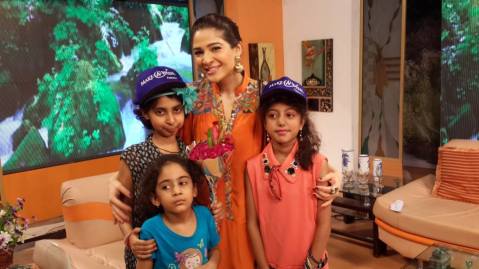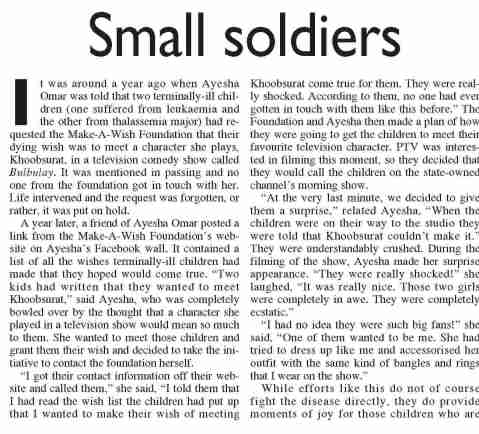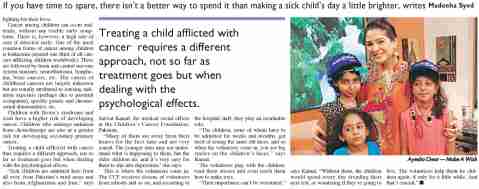Small soliders
If you have time to spare, there isn’t a better way to spend it than making a sick child’s day a little brighter.
It was around a year ago when Ayesha Omar was told that two terminally-ill children (one suffered from leukaemia and the other from thalassemia major) had requested the Make-A-Wish Foundation that their dying wish was to meet a character she plays, Khoobsurat, in a television comedy show called Bulbulay. It was mentioned in passing and no one from the foundation got in touch with her. Life intervened and the request was forgotten, or rather, it was put on hold.
A year later, a friend of Ayesha Omar posted a link from the Make-A-Wish Foundation’s website on Ayesha’s Facebook wall. It contained a list of all the wishes terminally-ill children had made that they hoped would come true. “Two kids had written that they wanted to meet Khoobsurat,” said Ayesha, who was completely bowled over by the thought that a character she played in a television show would mean so much to them. She wanted to meet those children and grant them their wish and decided to take the initiative to contact the foundation herself.
“I got their contact information off their website and called them,” she said, “I told them that I had read the wish list the children had put up that I wanted to make their wish of meeting Khoobsurat come true for them. They were really shocked. According to them, no one had ever gotten in touch with them like this before.” The Foundation and Ayesha then made a plan of how they were going to get the children to meet their favourite television character. PTV was interested in filming this moment, so they decided that they would call the children on the state-owned channel’s morning show.
“At the very last minute, we decided to give them a surprise,” related Ayesha, “When the children were on their way to the studio they were told that Khoobsurat couldn’t make it.” They were understandably crushed. During the filming of the show, Ayesha made her surprise appearance. “They were really shocked!” she laughed, “It was really nice. Those two girls were completely in awe. They were completely ecstatic.”
“I had no idea they were such big fans!” she said, “One of them wanted to be me. She had tried to dress up like me and accessorised her outfit with the same kind of bangles and rings that I wear on the show.”
While efforts like this do not of course fight the disease directly, they do provide moments of joy for those children who are fighting for their lives.
Cancer among children can occur suddenly, without any visible early symptoms. There is, however, a high rate of cure if detected early. One of the most common forms of cancer among children is leukaemia (around one third of all cancers afflicting children worldwide). These are followed by brain and central nervous system tumours, neuroblastoma, lymphoma, bone cancers, etc. The causes of childhood cancers are largely unknown but are usually attributed to ionising radiation exposure (perhaps due to parental occupation), specific genetic and chromosomal abnormalities, etc.
Children with Down’s syndrome and Aids have a higher risk of developing cancer. Children who undergo radiation from chemotherapy are also at a greater risk for developing secondary primary cancer.
Treating a child afflicted with cancer thus requires a different approach, not so far as treatment goes but when dealing with the psychological effects.
“Sick children are admitted here from all over, from Pakistan’s rural areas and also from Afghanistan and Iran,” says Sarwat Kamal, the medical social officer at the Children’s Cancer Foundation, Pakistan.
“Many of them are away from their homes for the first time and are very scared. The younger ones may not understand what is happening to them, but the older children do, and it’s very easy for them to slip into depression,” she says.
This is where the volunteers come in. The CCF receives dozens of volunteers from schools and so on, and according to the hospital staff, they play an invaluable role.
“The children, some of whom have to be admitted for weeks and months, get tired of seeing the same old faces, and so when the volunteers come in, you see big smiles on the children’s faces,” says Kamal.
The volunteers play with the children, read them stories and even teach them how to make toys.
“Their importance can’t be overstated,” says Kamal. “Without them, the children would spend every day dreading their next test, or wondering if they’re going to live. The volunteers help them be children again, if only for a little while. And that’s crucial.”
Newspaper view: [Click for larger image]


